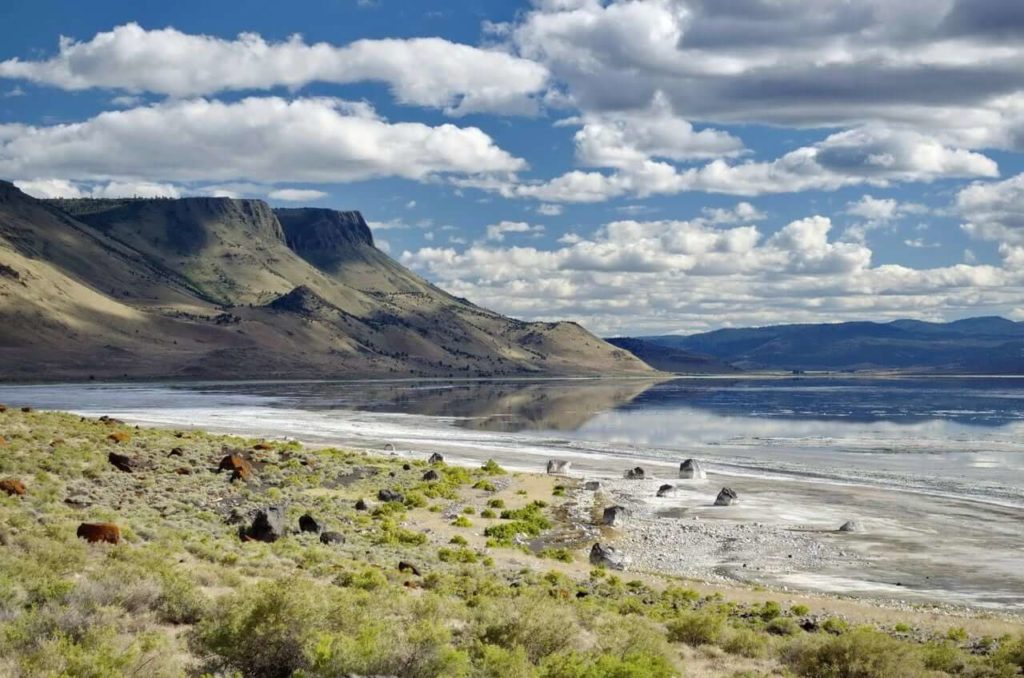By Rob Davis | Feb. 21, 2022 | The Oregonian
After ignoring its decline for years, state agencies have pledged to help Lake Abert, Oregon’s only saltwater lake and a vital stop on the Pacific Flyway, which has run dry twice in the last eight years.
In a Feb. 16 letter to environmental groups, the leaders of three state agencies said they would seek the help of a collaborative program at Portland State University, the National Policy Consensus Center, to identify short- and long-term solutions for the lake’s drying, which threatens to leave hundreds of thousands of migratory birds without a key feeding ground.
“We stand ready to work together toward a solution,” wrote the leaders of the state Department of Environmental Quality (DEQ), Water Resources Department (OWRD) and Department of Fish and Wildlife (ODFW).
Exactly what that solution will look like — or what it will cost — isn’t clear.
Still, the letter marks a turnaround from state agencies exactly a month after an investigation by The Oregonian showed the Department of Environmental Quality shut down an employee in 2015 when she concluded that a state-subsidized reservoir project had worsened the lake’s decline.
The employee, Amy Simpson, was directed to abandon her work after her analysis showed a private dam and reservoir on the River’s End Ranch, built next to Lake Abert with funding from the Oregon Department of Fish and Wildlife and others, had withheld billions of gallons of water from the lake, a death blow in dry years.
The agency leaders said any solutions for Lake Abert would need to involve numerous stakeholders, including tribes, while accounting for the complexity of water use in an area of the state where climate change is worsening water scarcity.
“In considering water management actions, we need to be thoughtful about the various tools and ‘levers’ we can use and consequences across the landscape,” they wrote.
Lake Abert is primarily fed by precipitation that flows from the Chewaucan River, which starts in the Fremont-Winema National Forest east of Klamath Falls, passes through the town of Paisley and ends at the lake along U.S. 395. The lake ran dry in 2014 and again last year, the only times that has happened since the Dust Bowl years of the 1930s.
Questions remain about what comes next.
The agency leaders said they were seeking the “potential engagement” of the National Policy Consensus Center, which is not yet on board. They didn’t specify a desired timeline if the center is hired or a funding commitment for it or possible solutions.
They offered no concrete details about how — or whether — they plan to address the River’s End Reservoir’s impact on the lake. The agency leaders didn’t address whether the state will revive Simpson’s abandoned work to fill in years-long data gaps or resolve long-delayed permits that have allowed the River’s End Reservoir to withhold water from Lake Abert for months at a time.
Lawmakers pressed for more details during a Monday hearing of the House Agriculture, Land Use and Water Committee. Rep. Anna Williams (D—Hood River), asked how long the collaborative effort would take. “Are we further along than just planning to make a plan?” she asked.
Racquel Rancier, deputy director of the Water Resources Department, said Gov. Kate Brown’s staff had contacted the National Policy Consensus Center and planned an initial meeting in early March. “It would be premature to comment on timeframes,” Rancier said. The department, which has yet to finalize long-stalled water rights permits that allow the ranch to store water in the reservoir and withdraw it, also has no timeframe for resolving those permits, she said.
Lawmakers said they wanted to see the state move quickly. “We have waited too long to have this very serious conversation,” said Rep. Susan McLain (D—Hillsboro). “I do believe it’s important for us to get going now.”
While environmental groups said they were encouraged by the state’s attention to Lake Abert, they said they expected a collaborative resolution to take years to develop. In the meantime, they said, Oregon could be taking concrete steps to help the lake.
“There are basic regulatory and data collection functions of these agencies that have long been neglected and need immediate attention,” said Lisa Brown, an attorney for WaterWatch of Oregon. “The lake is in urgent need of problem-solving efforts and implementation of actions. We support collaborative conversations, but those conversations need to happen in parallel with action.”
The House Agriculture, Land Use and Water Committee plans to hold a second hearing on Lake Abert in May to gather testimony from the public and environmental groups.
This article originally appeared in the Feb. 21, 2022, edition of The Oregonian, and was later updated on April 5, 2022.

